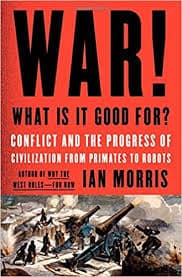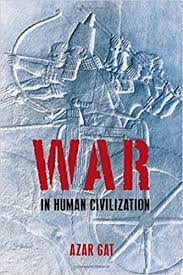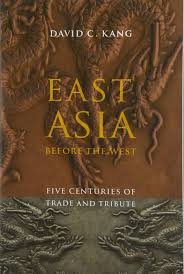 I just finished reading War! What Is It Good For?: Conflict and the Progress of Civilization from Primates to Robots where the author argues that hegemonic Leviathans are actually good for average human well-being because they maintain order and peace. In other words, a multipolar balance-of-powers situation is dangerous. Unipolarity is less dangerous.
I just finished reading War! What Is It Good For?: Conflict and the Progress of Civilization from Primates to Robots where the author argues that hegemonic Leviathans are actually good for average human well-being because they maintain order and peace. In other words, a multipolar balance-of-powers situation is dangerous. Unipolarity is less dangerous.
For various personal normative reasons, I’m not entirely happy with this conclusion. But, this book and others have convinced me that this is probably correct (for others, see The Fall of Rome). So on some level, the Claire Berlinksi thread post below reflects a lot of truth. But I think it is wrong to get overly exorcised over Donald Trump’s acceleration of American involution.
 The reason is that is that inevitable forces of economic determinism mean that the American unipolar world is not going to be maintained into the 21st century. In the late 1990s, with Japanese somnolescence, Russia as a supine post-superpower, and China only starting to get its footing as a capitalist nation, the vision of eternal American hegemony in our time was not a simple fantasy. It was an extension of the world that we saw around us.
The reason is that is that inevitable forces of economic determinism mean that the American unipolar world is not going to be maintained into the 21st century. In the late 1990s, with Japanese somnolescence, Russia as a supine post-superpower, and China only starting to get its footing as a capitalist nation, the vision of eternal American hegemony in our time was not a simple fantasy. It was an extension of the world that we saw around us.
That world is gone.
 A quick check of GDP (PPP) by nation(s) tells us that China + India is now already ~75% of the USA + European Union. On a nominal basis, all the forecasts seem to put China and India #1 and #3 in GDP by 2030. On a per capita basis, these nations are going to be poorer than the West for a while longer. But in terms of power projection that may not matter so much. The fact that Czarist Russia and the Soviet Union were poorer per capita and had less human capital per unit didn’t prevent them from grinding superior western and central European powers down through sheer size.*
A quick check of GDP (PPP) by nation(s) tells us that China + India is now already ~75% of the USA + European Union. On a nominal basis, all the forecasts seem to put China and India #1 and #3 in GDP by 2030. On a per capita basis, these nations are going to be poorer than the West for a while longer. But in terms of power projection that may not matter so much. The fact that Czarist Russia and the Soviet Union were poorer per capita and had less human capital per unit didn’t prevent them from grinding superior western and central European powers down through sheer size.*
As a man in his 70s Donald Trump doesn’t seem to grasp that America cannot dictate as much by force of will as it could in the second half of the 20th century when he came into the fullness of manhood. But he’ll learn. And America will learn.
Our society is rich and wealthy. We are powerful. Our armed forces are the sharpest and longest blades on the face of the earth. But aside from the inexorable heaving emergence of the Asian nations the United States, and the West more generally, seems to be gripped by alternating fluxes of anomie and ennui. Trump’s election is a reflection of this.
* I refer here to the Napoleonic Wars and World War II. The Czarist collapse of World War I strikes me in some ways a collapse in morale and national spirit.
where did the comments on this post go?
Were there comments?
from why i recall last night. yeah.
I doubt he will learn, Razib, but the country will. Painfully, as with such lessons.
As I understand Ian Morris the value of war is not in establishing hegemony or a unipolar international system so much as it is in uniting ever larger groups of people. Presumably ever greater economies of scale and division of labor allow larger societies to be more productive and therefore more healthy, wealthy, and wise.
American nationalism then is really only “productive” insofar as it allows the US to ensure the free flow of goods, capital, and people on ever larger scales. Certainly there are people who believe the US is a force for this, but I doubt Trump would be the figurehead most would bring to mind for this vision of American nationalism.
In any case one has to wonder if the rise of China and the rest really threatens free trade, and if it doesn’t then what is the point of war between potential hegemons? If globalization is already a fait accompli then there’s no point in conquering the world. Without markets to be opened there’s no profit to be made from winning a war.
“But he’ll learn. And America will learn.”
I dont think America would, and even if it does, its important what “lessons” America learns. I am not optimistic about it. It learnt the wrong lesson when China was rising and now once it has risen you see confusion on how to handle it.